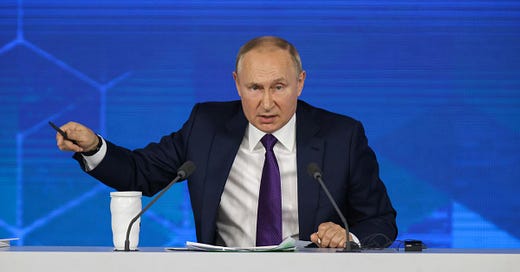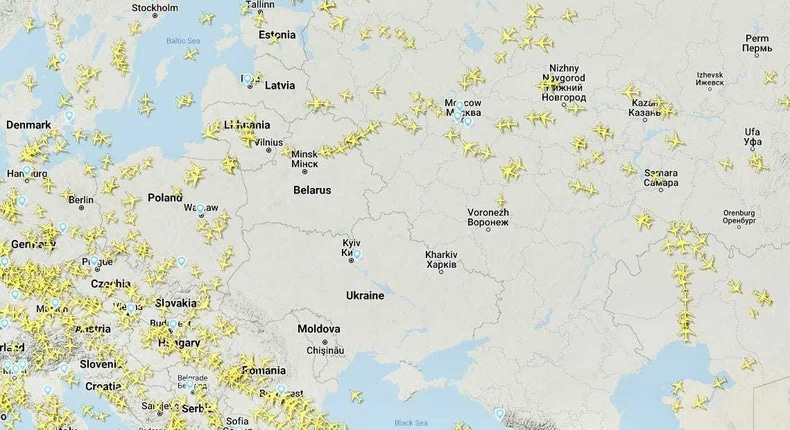It’s Friday!
This newsletter is about politics, economics, and culture in Nigeria. But today we are going to Eastern Europe!
I publish once a week, so definitely not spamming your mailbox.
And I’ll be chuffed to hear your thoughts. My email is solomon.elusoji@gmail.com.
As of this morning, Russian forces had gained entry into Kyiv, the Ukrainian capital. Just a little over 24 hours after the Russians invaded, President Volodymyr Zelensky said more than 100 Ukrainians had been killed and that he was the number one target. I won’t be surprised if he has been captured (or killed or fled the country) before you get this email - that’s the ruthless efficiency with which Vladimir Putin has planned his decimation of ‘little’ Ukraine. And no one’s coming to save the day. Not Germany or France or the almighty United States. “Our forces are not and will not be engaged in a conflict with Russia in Ukraine,” Biden said at a White House news conference on Thursday.
To gain some perspective about the events in Ukraine, I spoke to a friend and Russian scholar last night. Putin, they told me, has never considered Ukraine a real, independent country. Ukraine, to Putin, remains part of an imaginary Soviet Empire. Of course, the real Soviet Empire collapsed in 1991, but Putin dreams of a resurgence, a return to the glory days. And Ukraine is seen by many people as the cradle of Soviet civilisation
More pressingly, Putin calculated that Ukraine was inching more towards the west, with talks of the country joining Nato, a military alliance designed to counter the USSR in its heydays. In 2014, Viktor Yanukovych, a Russian ally, was ousted from the Ukrainian presidency after massive street protests. And in 2019, the Ukrainian parliament made “historic” changes to its constitution that would allow it to join the European Union and Nato.
But joining the EU and Nato will require the blessings of countries like Germany and France who really do not want to upset Russia. “We are opposed to the entry of Georgia and Ukraine [in NATO] because we think it is not the right response to the balance of power in Europe and between Europe and Russia,” former French Prime Minister François Fillon said in 2008 when the idea was floated. And the same still holds true in 2022. “There is no security for Europeans if there is no security for Russia,” French President Emmanuel Macron said when he met with Putin before the invasion.
As Putin started to mass troops at the Ukrainian borders, he asked Nato to provide a guarantee that Ukraine will NEVER join the alliance. “We need to resolve this question now … [and] we hope very much our concern will be heard by our partners and taken seriously,” Putin said.
As far as Putin is concerned, Ukraine’s alliance with the west is an existential threat to his rule in Russia. And invading the country was imperative to keep his regime, not necessarily the prosperity and security of ordinary Russians, intact. “The thing Putin is most scared of is having a thriving democratic country with a lot of kinship with Russia right on his border,” says Barry Pavel, senior vice president at the Atlantic Council. “It would cause enormous problems for him. For his own narrative, for his own security and power base.”
What next?
The overthrow of the Ukrainian government is most likely to be quick, my Russian scholar friend told me. “But it’s one thing to invade a country and another thing to occupy it.” Ukrainian nationalists, with the help of the West, may resort to fighting guerilla wars. On the other hand, we could have a Belarus situation, where a new Ukrainian government beholden to Putin is installed and the world continues to spin.
There’s almost no possibility in the near future that Putin will extend his imperial ambitions beyond Ukraine, to Baltic nations such as Estonia, Latvia, and Lithuania, who are all Nato members. That would confirm his mental state.
In the meantime, the West has announced a slew of sanctions designed to hasten the crippling of the Russian economy. Putin’s gambit is his foreign reserves (about $630 billion) and the help of China, which also harbours territorial ambitions in Taiwan.
On Thursday, videos of anti-war protests in parts of Russia emerged on Twitter. But my Russian scholar friend wasn’t optimistic about an uprising against Putin.
“How’s the Putin regime going to end? If I was going to bet, I’d say it’s only death that would remove him from power. Last year, he changed the constitution to allow him to run perpetually. I don’t expect protests to catch him out. Sanctions on Russian oligarchs won’t work either because Putin doesn’t listen to them. They owe their survival to him. I have no illusions about the regime.”
Nigeria’s agenda
A significant number of Nigerians live and study in Ukraine. I spoke to a couple who told me they are hiding in bunkers and bomb shelters. The Nigerian government has said it is working to provide evacuation flights, but it is not clear how they hope to achieve that since the Ukrainian airspace is now a warzone.
And the price of crude oil has shot up. Could have been good news for Nigeria if only we refined our own petroleum. But that simply means the price of subsidy also goes up.
Because Russia and Ukraine together produce nearly a quarter of the world’s wheat, the price of the commodity has also shot up. Nigeria imported N86.75 billion of Durum wheat from Russia in Q3 2021. Mackerel worth N30.69 billion were also imported from Russia during the same time frame.
In its only official response to the invasion, the Federal Government said it was surprised. It hasn’t yet condemned Russia’s actions - the African Union has - but not many are holding their breath for the government’s position. “No one cares about what the Nigerian government thinks,” my Russian scholar friend said. “Nigeria is not a serious country.”





